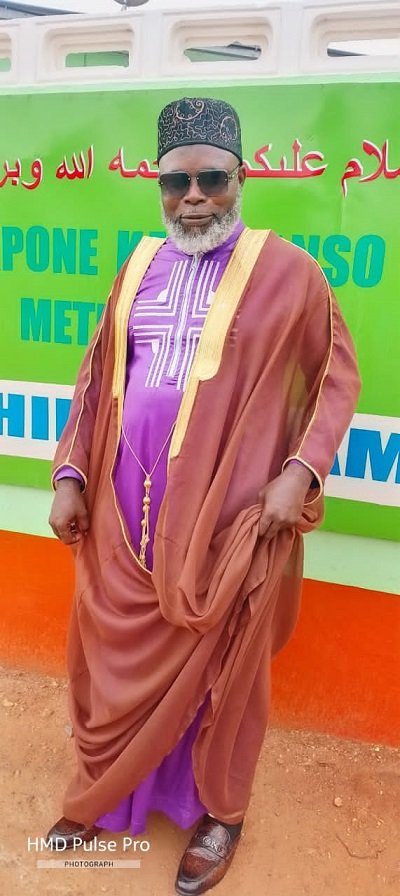Fruitful Living
The fruit of patience “But the fruit of the Spirit is Patience.” – Galatians 5:22

INTRODUCTION
Patience is a virtue, one that is essential for healthy living. Its vital role in every human relationship has made it a subject of intense scrutiny by all kinds of professionals. Yet, in spite of all the extra attention, PATIENCE remains a very scarce commodity in our fast-paced world.
1. PATIENCE BRINGS THE BLESSING OF GOD
The writer of Hebrews 11:39-40 says, ‘These were all commended for their faith, yet none of them received what had been promised since God had planned something better for us so that only together with us would they be made perfect.’ Their patience and perseverance ended in more waiting. What is the plan that God has prepared for us? What is the ‘something better’? Who can say for sure? His purpose will not be entirely consummated until Jesus splits the skies and history is finished. And then we will know the end of all truth.
God never lies; all that He has promised will come to be after we have waited long enough. Patience will at last expose us to glory immeasurable, for patience is the key to the final blessing of God.
2. PATIENCE, LIVING BY GOD’S TIMETABLE
Prayers are voiced from the perspective of our timeframe, but they are all answered from God’s timetable. In 1 Samuel 1:9-28, Hannah knew this great truth of prayer, the length of time between our asking and God’s supply is patience. Hannah received exactly what she had asked for. But the key to her blessing lay in her steadfastness.
Jesus is a wonderful model of patience. He had only a few years to minister on this earth, yet He never worried that He would not have time to accomplish all that God had planned for Him. He trusted God’s perfect timetable.
3. PATIENCE, THE ART OF WAITING ON GOD
But do not forget this one thing, dear friends: With the Lord a day is like a thousand years, and a thousand years are like a day. The Lord is not slow in keeping His promise, as some understand slowness. Instead He is patient with you, not wanting anyone to perish, but everyone to come to repentance. – 2 Peter 3:8-9
There is an art required in patience – aligning our finite watches with God’s external clock. We do not have unlimited time to accomplish His plan for our lives. Therefore we must, as the psalmist suggests, ‘number our days aright’ – Psalm 90:12. First, we must pace ourselves so that we do not live frantically, and then we must schedule the appointments of our lives so that every earthly moment yields some heavenly product.
Therefore you do not lack any spiritual gift as you eagerly wait for our Lord Jesus Christ to be revealed. He will also keep you firm to the end, so that you will be blameless on the day of our Lord Jesus Christ. – 1 Corinthians 1:4-9
God has called us to wait. So we practise patience. But God has given us gifts to equip us to fulfill His purposes as we wait. Through His graciousness, we learn patience, and through our exercise of that patience, we fulfill His purposes.
4. PATIENCE AND MY RELATIONSHIP WITH CHRIST.
Since you have kept my command to endure patiently, I will also keep you from the hour of trial that is going to come on the whole world to test the inhabitants of the earth. – Revelation 3:10.
Christ reminds the church of Philadelphia that patient endurance under trial is the key to God’s special protection. Those who endure hurt with patience are behaving like Christ Jesus. He notices our pain, and walks with us through every step of the suffering. Just as God the Father felt every pain of His Son, so our Saviour feels our hurt and suffers with us every step of the way.
Indeed, the Psalmist in Psalm 39:5 is right: ‘You have made my days a mere handbreadth; the span of my years is as nothing before you. Each man’s life is but a breath’. During these fast-tumbling years, let us practise a determined patience and decide that these years will all be used for Christ. If we focus on using our time to develop our relationship with Him, we will never look at the time as wasted, for we will someday have eternity to reap the benefits of our time with Him now. A great hymn by Charles Thomas Studd sums up the attitude of a life filled with patience: ‘Only one life, twill soon be past; only what’s done for Christ will last.’
5. PATIENCE THE SLOWLY ACQUIRED VIRTUE
God’s historical motif in Nehemiah 9:30 is patience. He was patient with the Israelites when: they became arrogant, disobeyed His commandments, sinned against His ordinances, turned their back on God’s desires for them and became stiff-necked and refused to listen. Through all of their disobedience, the patience of God waited on Israel to return His love and behave like His children.
Patience is not a flaw in God; it is the glory of God. If God can extend His all-important, worldwide agenda by pacing Himself so as to save all, perhaps the practice of patience would do us all good.
6. PATIENCE, THE UNHURRIED VIRTUE
Then Peter came to Jesus and asked, “Lord, how many times shall I forgive my brother or sister who sins against me? Up to seven times?” Jesus answered, “I tell you, not seven times, but seventy-seven times. – Matthew 18:21-22
Peter felt magnanimous in suggesting seven-fold forgiveness as a worldwide standard. But Jesus reminded him that a better standard would be 77 times. The idea is that when we get to 43 times, we will probably quit counting. We may then become more like God in our willingness to forgive freely without credits and debits, without a calculator.
Patience is an unhurried virtue, it waits and forgives and waits and forgives. Patience is the virtue that demonstrates that we are fully in touch and at ease with the purposes of God in our lives.
7. PATIENCE, THE WAIT FOR WHAT GOD PROMISES
Now there was a man in Jerusalem called Simeon, who was righteous and devout. He was waiting for the consolation of Israel, and the Holy Spirit was on him. It had been revealed to him by the Holy Spirit that he would not die before he had seen the Lord’s Messiah. Moved by the Spirit, he went into the temple courts. When the parents brought in the child Jesus to do for him what the custom of the Law required, Simeon took him in his arms and praised God, saying: “Sovereign Lord, as you have promised, you may now dismiss your servant in peace. For my eyes have seen your salvation, which you have prepared in the sight of all nations: a light for revelation to the Gentiles, and the glory of your people Israel.” – Luke 2:25-32.
Simeon sings, ‘My eyes have seen your salvation.’ In this statement is the realised product of patience. God has many things to show us when the time is right. Until then, the wait itself is wonderful.
CONCLUSION
It is only through the work of the Holy Spirit on the heart that we can bear the fruit of patience. The hymn below by Thomas Gibbons summarizes patience for us in a profound way:
- Patience, O, ‘tis a grace divine, set from the God of peace and love,
That leans upon our Father’s arm, as through the wilds of life we rove.
- By patience, we serenely bear, the troubles of our mortal state,
And wait, contented, our discharge, nor think our glory comes too late.
- O, for this grace to aid us on, and arm with fortitude the breast,
Till, life’s tumultuous voyage o’er, we reach the shores of endless rest.
- Faith into vision shall resign, hope shall in full fruition die,
And patience in possession end, in the bright worlds of bliss on high
Culled from: Fruit of the Spirit Bible.
Stay blessed!
By Dr Joyce Aryee, the author
For further inquiries please contact us on Tel Nos. 0268130615 or 0243588467.
Email: saltnlightministries@gmail.com
Website: saltandlightministriesgh.org
Fruitful Living
Eid-ul-Adha: A living legacy of faith, sacrifice, and devotion

We begin in the name of Allah, the Most Merciful, the Most Compassionate. We praise Him, seek His help and forgiveness, and seek refuge in Him from the evils of our souls and the wrongs of our actions.
May peace and blessings be upon the Prophet Muhammad (peace be upon him), his family, his noble companions, and all those who follow his path until the Day of Judgment.
Understanding the essence
of Eid-ul-Adha
Eid-ul-Adha, the Festival of Sacrifice, is one of the two major Islamic celebrations observed by Muslims across the world.
It commemorates the unwavering submission of Prophet Ibrahim (Abraham, peace be upon him) to Allah’s command when he was prepared to sacrifice his beloved son Isma’il (Ishmael, peace be upon him). Allah, in His infinite mercy, intervened and replaced the son with a ram, thus honouring Ibrahim’s sincerity and faith.
This moment of sacrifice is recorded in the Qur’an: “Then when they had both submitted and he put him down upon his forehead, We called out: ‘O Ibrahim! You have fulfilled the vision.’ Indeed, We thus reward the doers of good.” (Surah As-Saffat, 37:103–105)
This act of obedience is not merely a historical account. It is a living symbol that forms the essence of Eid-ul-Adha.
Ibrahim (A.S): The Architect
of Submission
Before the moment of sacrifice, Prophet Ibrahim and his family played critical roles in establishing Islam’s foundational pillars:
1. The building of the Ka‘bah
Prophet Ibrahim and his son Isma’il were chosen to construct the Ka‘bah, the sacred House of Allah in Makkah. The Qur’an records this noble moment:
“And [mention] when Ibrahim was raising the foundations of the House and [with him] Isma’il, [saying], ‘Our Lord, accept [this] from us. Indeed, You are the Hearing, the Knowing.’”
(Surah Al-Baqarah 2:127)
This structure remains the spiritual centre of Muslim worship, facing which over a billion Muslims direct their daily prayers.
2. The struggle of Hajar (Hajara) between Safa and Marwa
The mother of Isma’il, Hajar (Hajara), exemplifies a profound lesson of patience and faith. Left in the barren valley of Makkah with her infant, she ran between the hills of Safa and Marwa, desperately searching for water. Her perseverance was rewarded when the well of Zamzam sprang forth at the feet of her baby.
Her sincere struggle is now ritualised in Hajj as the Sa‘i between Safa and Marwa—a reminder of the role of women, the power of du‘a, and the value of trust in Allah’s provision.
Sacrifice at Mina and the
Rites of Jamarat
During Hajj, pilgrims reenact Ibrahim’s confrontation with Shaytan at Mina, where he rejected the devil’s temptation and cast stones at him. This act is now observed in Hajj as the ritual of stoning the Jamarat, symbolising the rejection of evil, temptation, and disobedience.
It is a vivid spiritual lesson: the path to Allah is one of resistance to distraction and sin, and one must be prepared to fight these forces with unwavering faith.
The essence of Arafat in Hajj
The Prophet Muhammad said:“Hajj is Arafah.” (Sunan al-Tirmidhi, 889)
Standing on the plain of Arafat, in deep humility and supplication, is the heart of Hajj. It represents the Day of Judgment, when all of humanity will stand before their Creator. The Prophet said: “There is no day on which Allah frees more people from the Fire than the Day of Arafah.” (Sahih Muslim, 1348)
For pilgrims, Arafat is a time of repentance, reflection, and renewal— and for non-pilgrims, fasting on that day is highly recommended.
Three core lessons from the
Sacrifice of Prophet Ibrahim
(A.S.)
1. Absolute obedience to Allah
Ibrahim’s willingness to sacrifice his son teaches that the essence of faith is unquestioning obedience to Allah. He prioritised divine command over emotion, logic, or comfort.
Takeaway:
In our lives, we must also be ready to put aside our desires, egos, and even attachments if they conflict with Allah’s instructions. This may involve sacrifices such as waking up for Fajr, staying away from haram income, or being truthful in difficult situations.
2. Sincere intention and inner sacrifice
The real essence of the sacrifice lies in the heart’s submission to Allah.
It is neither their meat nor their blood that reaches Allah, but it is your piety that reaches Him.”
(Surah Al-Hajj 22:37)
Takeaway:
Every act of worship should be grounded in sincerity. Whether it is prayer, charity, or sacrifice, what matters most is the purity of our intention.
3. Sacrifice for the greater good
The legacy of Eid-ul-Adha teaches us that sometimes, faith requires us to give up what we love for a greater purpose. Sacrificing wealth, time, or status in the path of Allah or for the benefit of others leads to spiritual elevation.
Takeaway:
Use your resources such as time, money, skills, for acts of benefit: support the poor, educate the young, assist the sick, and build your community.
Celebrating Eid-ul-Adha: A
Festival for all Muslims
Even for those who do not go on Hajj, Eid-ul-Adha holds immense significance. Muslims across the world participate in the act of Qurbani (sacrifice) to honor the tradition of Ibrahim (A.S.).
Types of animals and their
symbolism
Permissible animals include goats, sheep, cows, and camels. Each must meet a minimum age and be free of defects. The sacrificed animal is then divided into three parts: one for the family, one for relatives and friends, and one for the poor and needy.
This distribution reflects the spirit of sharing, compassion, and social responsibility—values at the heart of Islam.
The eternal message of Eid-ul-Adha
Eid-ul-Adha is not merely a celebration; it is a living tradition that calls us to:
• Submit like Ibrahim,
• Strive like Hajar,
• Sacrifice like Isma’il,
• Reflect like the pilgrims at Arafat.
May this Eid awaken within us a renewed commitment to obedience, sincerity, and compassion.
Let us make every Eid-ul-Adha a step forward in our spiritual journey, embodying the values of submission, sacrifice, and service to humanity. I wish every Muslim Eid Mubaarak
By Imaam Alhaji Saeed Abdulai
(Kpone Katamanso Metropolitan Chief Imaam)
Fruitful Living
Steps taken by government to combat illicit drugs (Final part)
The Minister for the Interior, Muntaka Mohammed-Mubarak, has reaffirmed the government’s commitment to combating drug abuse and illicit trafficking for a safer environment which would
go a long way to make Ghana a drug-free country. 3News.com (2025)
Solutions to Illicit Drugs from the Islamic perspective
are comprehensive and emphasise of both prevention and treatment:
Tarbiyah (Islamic nurturing): Instilling strong Islamic values from childhood through Qur’anic education, regular prayer, and association with righteous companions.
Community preaching (Da’wah): Imams must consistently raise awareness during khutbahs and Islamic programs about the dangers of drugs and the beauty of a sober, productive life.
Faith-based rehabilitation: Mosques and Islamic centers can partner with medical institutions to offer Qur’an therapy, spiritual counseling, and structured recovery programs.
Islamic youth clubs: Providing youth with halal entertainment, mentorship, and purposeful engagement can steer them away from harmful peer groups.
Zakat and Sadaqah: Channelling funds to support families of victims and establishing centres for rehabilitation.
Role of Parents, Society, Muslim Chiefs and Imams:
Parents must be vigilant and provide emotional support. A loving, nurturing home reduces a child’s vulnerability to drugs.
Society should de-stigmatize addiction. Drug users should be seen as patients needing healing, not criminals deserving rejection.
Muslim Chiefs must lead community campaigns, setting moral examples and supporting policy enforcement.
Imams must be more than religious leaders—they must become counsellors, educators, and advocates. Their leadership can shift public perception and guide collective action.
Conclusion
Illicit drugs pose one of the most dangerous threats to our society, undermining our religious values, harming our youth, and destroying our future. The Islamic position is clear and
Unequivocal: such substances are forbidden due to their destructive consequences on all aspects of life. Islam does not merely condemn the act but calls for a holistic response—spiritual, social, and structural.
As a society, particularly as Muslims, we must rise to confront this crisis with faith, compassion, and commitment. We must not only preach against drugs but actively work to rehabilitate victims, educate the next generation, and partner with public institutions to create a society of wellness and righteousness.
Recommendations
1. Introduce Islamic drug awareness education in madrasas and public schools, using Quran and Hadith-based materials to instill moral responsibility.
2. Create partnerships between the Ghana Narcotics Control Commission, Ghana Health Service, and Muslim organisations to develop culturally sensitive rehabilitation centres.
3. Train Imams and teachers in basic mental health and drug abuse counselling to serve as front-line responders in communities.
4. Utilise Friday sermons (khutbahs) nationwide to address the dangers of drug abuse periodically and provide practical steps for prevention.
5. Encourage community surveillance, where parents, chiefs, and youth groups report dealers and suspicious activities to the authorities.
6. Establish mentorship programmes in every Muslim community where successful, drug-free role models mentor youth.
7. Form interfaith coalitions, working across religious lines to tackle the drug menace as a national threat rather than a religious issue.
8. Provide job skills training for rehabilitated victims, helping them reintegrate into society and live dignified, self-sufficient lives.
By Imam Alhaji Saeed Abdulai, the Author







